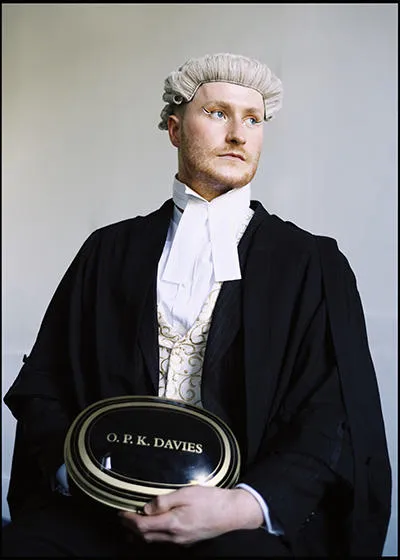 'In some ways, being a barrister is a form of drag'.
'In some ways, being a barrister is a form of drag'.
Congratulations on winning our Changemaker accolade for your groundbreaking LGBTQ+ advocacy. How did your journey into this world begin?
I’ve always done social justice work in the background, before becoming a barrister. This involved going to protests, doing drag or finding ways to challenge the gender binary.
In some ways, being a barrister is a form of drag. We both wear wigs. We both tell stories through narrative techniques. We both have to convince our audience of a position. We both inhabit roles to convince, provoke and command the room.
While one profession is ‘revered’ in many circles, the other is villainised and seen as dangerous to children. But why? Power. Privilege. And the structures that decide which performances are called 'respectable' – and which are called a threat.
I got tenancy at Garden Court Chambers after a bumpy ride. 2020 marked the Taylor vs Jaguar Land Rover Ltd case. It was the first case confirming non-binary as a protected identity under the Equality Act 2010.
When a barrister gets tenancy, they get their names and title displayed outside the chambers. My Head of Administration knew I was non-binary and asked me how I would like my title to be written – an important and empathetic gesture that more colleagues should consider. I chose Mx (pronounced ‘mix’) which is the gender-neutral honorific. I wondered if I was the first person at the bar to go by ‘Mx’, so I posted a picture of my name board on Twitter/X.
The post went viral, and Legal Cheek contacted me, confirming this was correct and offering to write an article about me. Then The Times got in touch and wrote a whole feature on this supposed ‘legal first’. At the time, I don’t even think I was out as non-binary to my parents, so it was a simultaneous public and private coming out.
I wanted to use the press attention to do something positive, so I set up my Instagram account (@nonbinarybarrister). I create explainer videos and infographics on legal issues affecting trans and non-binary people. My aim is to help people understand their rights and to campaign for equality for marginalised groups. The lack of access to understanding of human rights in the general population is troubling. Who are we, as lawyers, to be gatekeeping people understanding their fundamental rights?
What’s been your proudest career moment so far?
Winning a King’s Distinguished Alumni Award is iconic. I think the word ‘distinguished’ carries a certain level of deference. I also find it funny as I’m just a random person living my life as authentically as I can!
Another humbling moment was winning Legal 500’s LGBTQ+ Champion of the Year Award 2024. I was up against about several very qualified people – including two KCs – so I thought, ‘I’m never going to win this.’ But it happened, so that was a nice surprise.
I do a lot of pro bono legal work, which is rewarding but challenging. A lot of my trans clients don’t have money, so it’s not a very lucrative game I’m playing. I was a finalist for the Advocate Young Pro Bono Barrister of the Year (2024). It was validating to be recognised by the legal industry, but it does not address the bigger structural issues we face in terms of access to justice. Pro bono should not be necessary, yet it is in today’s society.
While the awards are great, what I find the most fulfilling is getting a great result for a vulnerable client. Being their voice in a legal sense to attain that result is so rewarding.
What’s been the biggest challenge?
Last year, I lost about four cases in a row and I felt like I was bad at my job. This year, I’ve had several wins in a row, so you have to take it all with a pinch of salt. Despite what you may think, in law the answer is not always black and white. But I suppose I would say that, wouldn’t I?
Being a non-binary barrister with a social media presence, I’ve had people call me some vile names online. But ultimately, it doesn’t really go to my head as I know those people are probably going through some painful stuff to act like that. I try to look at it with compassion and ignore the haters. I literally get paid to argue. Why would I argue with you for free online?
To be a successful barrister, you have to detach a bit. Though it can still be difficult.